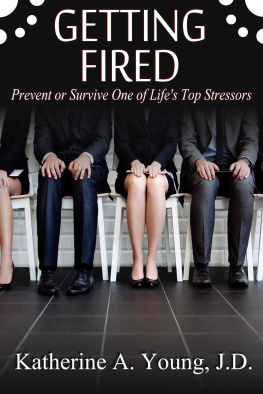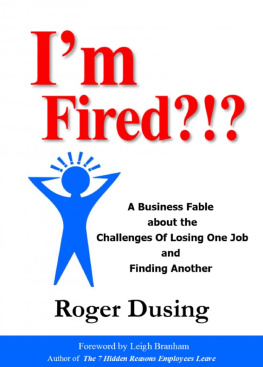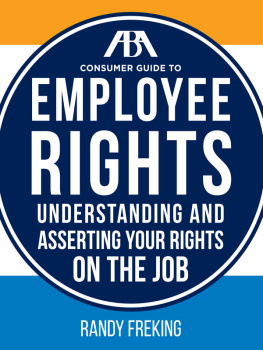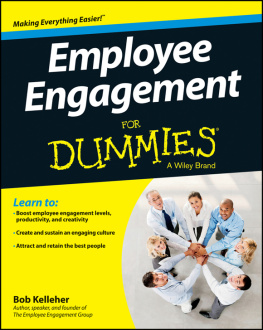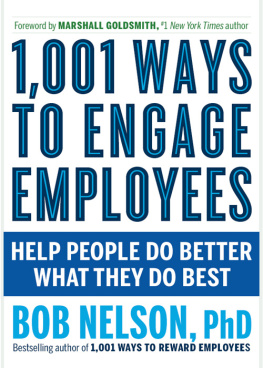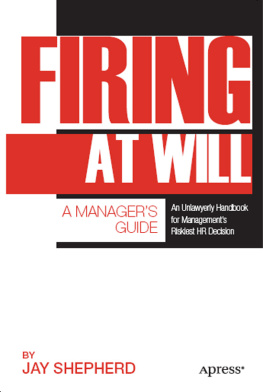GETTING FIRED
Prevent or Survive One of Lifes Top Stressors
Katherine A. Young, J.D.

Copyright 2015 Katherine A. Young.
This ebook is licensed for your personal enjoyment only. This ebook may not be re-sold or given away to other people. If you would like to share this book with another person, please purchase an additional copy for each reader. If youre reading this book and did not purchase it, or it was not purchased for your use only, then please return to your favorite retailer and purchase your own copy. Thank you for respecting the hard work of this author.
Cover design Melissa Alvarez, BookCovers.us
Cover photography Depositphotos.com
Ebook formatting by Maureen Cutajar, GoPublished.com
ISBN: 978-0-9969068-0-7
TABLE OF CONTENTS

INTRODUCTION
I have practiced employment law for twenty years. During those years, I have counseled hundreds of people who have been fired. Most were sad, worried, and surprised. Often they told me a long story of a deteriorating work situation that should have set off alarm bells. I frequently heard regretful statements of, I should have seen it coming. Over and over I listened to, I really need my health insurance. I dont know how we will make it. We live paycheck to paycheck. I knew that something was wrong.
I have also met with a much smaller group of people who felt something was wrong at work but could not decide if they were letting their imagination run away with them. Those people came to tell me about their situation and to get counseling from an objective person who knew no one involved and could cut through the personal hurt feelings. Many were angry, defiant, and convinced the company could not fire them without legal consequences. Those people were often bitterly disappointed to find the law had no protection for them at all. Their job could be taken away with no legal consequences to the company.
Also, during those years, I have talked to a small percentage of people who were fired but who were prepared. They had started or completed a job search, they had saved the money they could tuck away, and they were able to act in a calm, professional manner when called to the conference room. Some were even able to negotiate a severance or a written reference letter.
I dont want that sad, worried, and surprised freshly-fired person to be you. This book will tell you how to recognize what is happening, plan for the worst, and avoid the mistakes made when a firing is a surprise. With the guidance you will find in this book, you will be able to make an action plan and maintain your dignity, even if your job is not salvageable. I want you to be one of those people who look back at a job ending and say, I landed on my feet.
Throughout the book, I will use composite examples of real situations of people who have faced a potential firing. I have changed the details and merged facts of many clients from past years to protect people who have come to me for the confidential advice of an attorney. At the beginning of each section, you will read about a worker whose problem may mirror your own. I hope the advice given to each worker and the following explanation will help you make the best decision for your problem.
If nothing else, it may help you decide you need to scrape up the money from somewhere to try to safeguard your livelihood by seeking legal help. Your job is often your most precious asset. What other investment do you have that pays you regularly and provides you with almost all of your financial support? It is a precious thing, and I find people often underestimate how valuable a job is to them. Even a boring or unpleasant job may not be easy to replace.
This book is not a substitute for legal advice. It is only a guide and cannot possibly address every situation, all of which are unique and fact-specific. Your facts may make a general suggestion in this book totally unsuitable for your situation. You may be reading this book in a state with differing laws and unemployment regulations than the ones to which I refer. I strongly urge anyone with a legal problem to seek competent legal help in your own community or state. Use your common sense when making life-changing decisions and seek legal help if needed.
If you read through this book, take the quizzes, and follow the suggested preparation steps. You will create a plan that can be used if ever needed. If your suspicion is wrong and you are not fired, you can relax and recommend this book to the next friend who says to you, I think I might be getting fired.

CHAPTER ONE
SHOULD YOU SEE A LAWYER?
Americans are generally sunshine people. We are high hopes, singing in the rain kind of people. This is, of course, a good trait. But sometimes, it can cause a warped view of reality. Lawyers view life at the opposite end of the spectrum. We definitely do not have a sunshine view of life. Lawyers are rigorously trained to see the potential detrimental outcome of any situation. This is often the reason why people hire a lawyerto advise them how to avoid a potentially serious consequence not seen by the average person.
Your task in reading through this material is to balance your natural optimism with a dose of realism. This book is designed to offer you the counter-point that might be given to you in a private consultation with a lawyer. However, I will always recommend to people they see a plaintiffs employment lawyer if they have the opportunity, the available funds, and the time.
Not Every Lawyer is an Employment Lawyer
You may have gone to college with a friend who is now a real estate lawyer. Your brother-in-law may be an anti-trust lawyer. Or, you may look online for a lawyer close to you and find a lawyer who lists 10 areas of practice, one of which is employment. These may be fine lawyers but may not know some of the subtle but significant issues in employment law today. Be careful about going to a lawyer who does not practice employment law regularly.
Employment law changes monthly, and it can be hard to keep up with all the reading required if you have other main areas of practice. If you have any choice at all, try to find a real employment lawyer who focuses on representing individuals. Employment law is an area full of complex, fact-specific law, and most lawyers do not want to practice in this area for individual plaintiffs. There are many defense employment lawyers who get paid to defend companies from the claims of individuals. But there are far fewer plaintiffs lawyers for the simple reason it is a David versus Goliath type of law practice. There are not many cases resulting in large settlements, so plaintiffs lawyers often are not paid anywhere near the amount defense lawyers earn.
One resource is the National Employment Lawyers Association (NELA) at www.nela.org. You can search online for an employment lawyer near you. In order to belong, members of NELA have to certify they represent mostly plaintiffs in employment disputes.
Expect to Pay a Consultation Fee
A lawyers time and advice are his stock in trade.
Abraham Lincoln
Expect to pay a charge for your consultation with a plaintiffs employment lawyer. Occasionally, my firm will receive a call where the caller says, I want to see if I have a case before I pay any money. An understandable desire, but not realistic.
Would your doctor waive her fee if you asked for the same consideration? Imagine you called your local clinic and said, Can the doctor spend half an hour on the phone with me without charge? Or could I meet with the doctor for an hour to show her all of the information I have gathered and downloaded from the internet? I want to see if I can be cured before I pay any money. If I cant be cured, it should be free. The doctor would say, quite rightly, I have to operate a business and cannot see people for free. I cant cure everyone, and I cant base my fees on whether I can cure people. Many times a patient comes to me with a problem I cannot cure, but I still spend time with them and have to operate a clinic in order to provide care.
Next page
